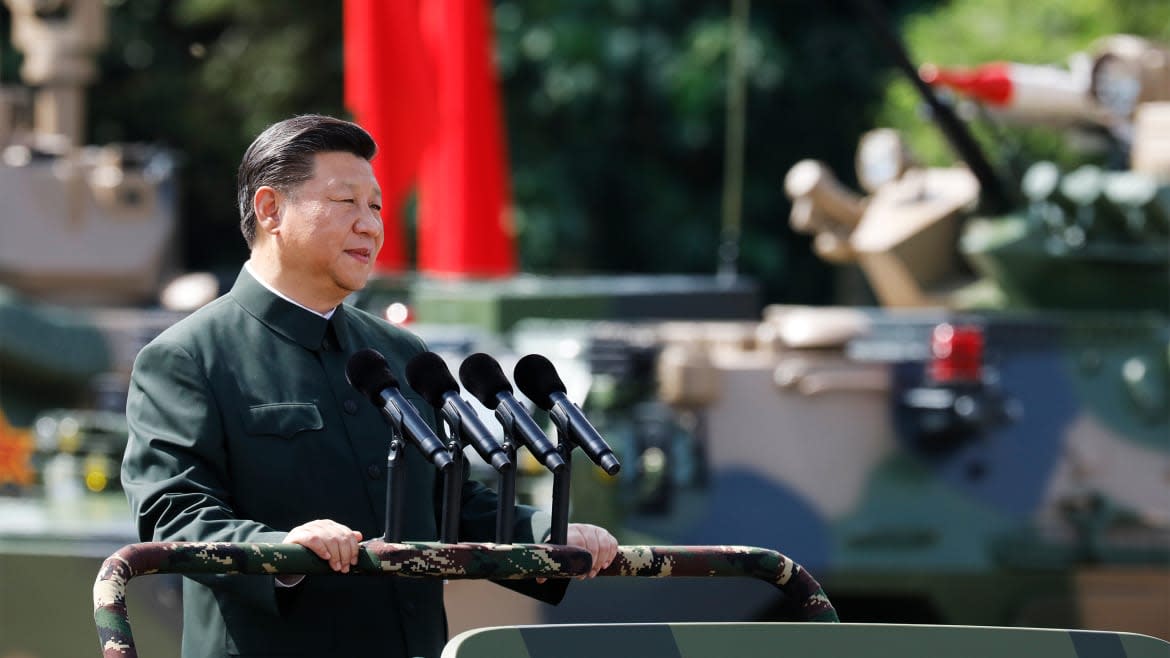Desperate Xi Jinping Needs a Win in Hong Kong After Mass Protests

On Sunday, nearly two million people walked along the main roads of Hong Kong Island to demand that Chief Executive Carrie Lam, the territory’s highest political officer, withdraw a bill that would permit expedited extradition of fugitives to mainland China. Demonstrators also demanded that Lam, who has held her office for less than two years, resign.
Hong Kong Isn’t Burning, but Its People Are on Fire
Just about no one thinks Lam will serve out her full five-year term.
She may not be the only casualty in the coming months. Xi Jinping, president of the Chinese state and general secretary of the Communist Party, now looks vulnerable.
Someone in Beijing is going to be blamed for the extraordinary turn of events in Hong Kong, a special administrative region of the People’s Republic of China. At the end of March, a demonstration against the extradition bill drew only 12,000 people, so the erosion of popular support for Beijing, generally seen as the force pushing the legislation, has been dramatic.
Xi once held the Hong Kong portfolio on the party’s Politburo Standing Committee, its top decision-making body. Now, the faceless Han Zheng formally has that hot-potato responsibility, but the hardline policies he is implementing are known to be Xi’s.
There’s another reason why Xi will get blamed. He has, since becoming China’s ruler almost seven years ago, accumulated unprecedented power. That means he has few people to blame.
And there are a lot of figures gunning for Xi. He has either jailed or sidelined opponents. Rivals have, for the most part, lain low in recent years, but they are surely waiting for a moment to strike back should Xi stumble.
Two million angry, defiant “anti-China” Hongkongers in the street is considered, of course, a stumble.
So are other policy failures. First, Beijing elites are now asking “Who lost America?” For decades, China has gotten what it wanted out of Washington, but Xi’s unusually aggressive policies have turned many in the United States capital against China. The “trade war” is not helping matters for Xi.
The second policy failure is the Chinese economy. Last month produced a batch of figures pointing to either zero growth or contraction. Imports, a good proxy for domestic demand, were down 8.5 percent year-on-year. Bellwether car-sales figures plunged 16.4 percent, the 11th straight month of decline and the worst-ever monthly drop. Figures in positive territory, like industrial production, were showing multi-year-low increases.
Growth is atrocious, but debt accumulation is worse. Even if one believed official reports of 6.4 percent growth in the first calendar quarter of this year, Beijing was taking on debt five-and-a-half times faster than it was producing nominal gross domestic product. Call that the makings of a disaster. At the same time, Xi’s anti-reform economic policies, many of which resemble Mao’s in broad outline, are catching flak.
Need more policy disasters? There is no shortage of criticism in Beijing political circles of Xi’s extravagant Belt & Road and Made in China 2025 initiatives.
Xi Jinping could survive a few bad months in Hong Kong, but Hong Kong, added to other failed policies, could be a fatal brew.
Why? Xi has deinstitutionalized the Communist Party, eliminating rules and norms that have, in the post-Mao period, restrained infighting.
Many analysts in the trade war say President Donald Trump faces re-election next year while Xi, by eliminating the term limit for his state presidency, has made himself “emperor for life.” This point is made to show that the Chinese ruler can think long-term, that he can outlast Trump in the trade war.
It is more appropriate to say, however, that, as the Chinese political system is now configured, Xi faces an election every day. Any day, he can be deposed in no-holds-barred fighting.
And should Xi be deposed, he stands to lose not just his posts but also assets, freedom, and life.
This means, among other things, that Xi has powerful motivations to make short-term decisions.
So when Xi Jinping sees Hong Kong people in the streets, he is thinking he needs a win somewhere to improve his rapidly deteriorating position. Therefore, he has all the incentive to try to bring the city back into line, perhaps using force.
It looks like he has already made preparations. If Xi decides to go for broke, he will almost certainly rely on the People’s Liberation Army garrison in Hong Kong, stationed there since July 1997 when Britain “handed over” the territory to China.
Hong Kong’s Weekend of Rage Puts as Many as a Million in the Streets
There are videos clearly showing that some Hong Kong policemen involved in controlling last week’s demonstrations could not understand Cantonese, commonly used in Hong Kong, and could not show police identification. The speculation, especially among Hong Kong netizens, is that they were Chinese soldiers wearing police uniforms.
Xi Jinping may be desperate, and Hong Kong’s people could be his next victims.
Got a tip? Send it to The Daily Beast here
Get our top stories in your inbox every day. Sign up now!
Daily Beast Membership: Beast Inside goes deeper on the stories that matter to you. Learn more.

